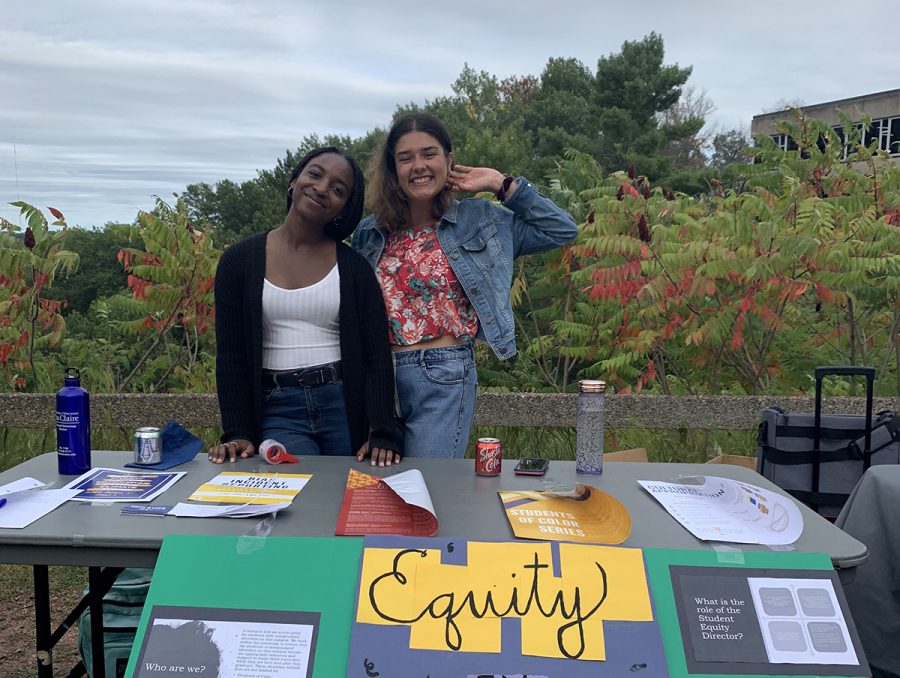UW-Eau Claire releases EDI training programs
Offerings include a mandatory course for incoming students and an optional certificate
Photo by SUBMITTED
Co-directors of the Student Senate’s Equity in Student Matters commission Iman Dikko, left, and Stephanie Hoeksema, right, said they believe the new EDI training programs are an important addition to UW-Eau Claire.
Since the Fall semester of 2020, UW-Eau Claire has begun offering Equity, Diversity and Inclusivity training programs to its students.
The programs include three tiers: the first tier: a mandatory course for incoming students, the second: a series of ten training sessions and the third: the completion of a project and correlating report related to EDI.
The idea for the program was brought forth by members of Student Senate last year.
Iman Dikko, former student director for the Student Senate’s Equity in Student Matters commission, said when first thinking about the potential for a UW-Eau Claire EDI training, herself and Co-Director Stephanie Hoeksema knew it was an important program to get behind.
“It represents marginalized communities on campus,” Dikko said. “When we heard about it we decided this is something we need to do.”
Hoeksema, a fifth-year elementary education and Latin American studies student, said she believes EDI training is important for understanding the world around you, including during students’ future careers and their time at UW-Eau Claire.
“For me EDI training is about helping people understand their context,” Hoeksema said, “And for some professions, majors or courses of study, that’s inherent, but for others it’s not integrated with what they’re working on.”
Jodi Thesing-Ritter, executive director of EDI, said incoming students are now required to complete Tier 1 of the program, an EDI training course.
In developing Tier 1, Thesing-Ritter said the team focused the training modules around marginalized identities.
“So we have socio-economic, religions, disability, race, gender and sexuality topics for folks to learn about identities,” Thesing-Ritter said. “Then, we’re also hoping that people will shine the spotlight on issues that need further addressing on campus and develop training for them as well.”
Tier 1 training consists of an outsourced software which was modified and personalized to better fit UW-Eau Claire, Dikko said.
“We thought including actual student stories was important,” Dikko said. “So we filmed videos of that. Some people on the planning committee also talked about their own experience to create a more personal program.”
Tier 2 includes a series of ten training sessions students can complete over the course of their time at the university, Thesing-Ritter said.
Instead of having ten mandatory sessions, she said students can choose between various learning opportunities, which include more a variety of training or written reflections on related campus events.
“Students can also attend the Racing Toward Justice series, where we’ve already featured Roxanne Gay and Alok Vaid-Menon,” Thesing-Ritter said. “Those events you could participate in and do a written reflection.”
Students will also have the opportunity to complete up to four opportunities in one day through the virtual Bridge to Change Conference from 10 a.m. to 4 p.m. on Nov. 8.
Tier 3 of the program consists of a project in which students are to incorporate the things they’ve learned over the course of Tiers 1 and 2, Thesing-Ritter said.
She said students will have relatively free reign in their choice of projects, which she said can range from collaborative projects with faculty to projects for organizations the student is a part of.
“We don’t want to constrain folks, we want to leave it open,” Thesing-Ritter said. “We hope projects will in some way enhance the campus. It’s the same as the approach we’re using for faculty and staff projects.”
Those who complete all three tiers, Thesing-Ritter said, will receive an EDI Leadership certificate which will be included on their transcript.
Hoeksema said the project had to evolve from its original concept — a training program made entirely by UW-Eau Claire — due to time constraints and limited resources.
“It’s not that we couldn’t have done it ourselves,” she said, “but we wanted to make sure we put a high quality product out.”
Hoeksema said she hopes the Tier 1 level will eventually receive the support needed from the university to have a training program made entirely by and for members of UW-Eau Claire.
“It doesn’t make very much sense to outsource this program when we have more than enough credible and knowledgeable individuals,” Hoeksema said. “It’s just a matter of investing in those people who can do the work. It’s counterintuitive for the university to charge folks to do that without resources or pay.”
For now, Hoeksema said the outsourced training is a good first step for the university.
Kopke can be reached at kopkelg3003@uwec.edu.

Lea Kopke is a fourth-year journalism and German student. This is her seventh semester on The Spectator staff. She plays the clarinet in the Blugold Marching Band and recently relearned how to ride a bike with no hands.


